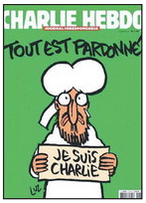By Paul Turner, The Spokesman-Review
Re-printed with permission

But in the wake of the recent killings by Islamist extremists at a satirical magazine in Paris, editors around the world have had to make a choice: Trumpet freedom of expression and demonstrate an unbowed commitment to press independence by reprinting controversial Charlie Hebdo cartoons depicting the Prophet Muhammad or decide that doing so would be unnecessarily inflammatory.
“Journalists have the right to publish all sorts of things,” said Lawrence Pintak, dean of the Edward R. Murrow College of Communication at Washington State University. “That doesn’t always mean they should.”
But Pintak, who was a CBS News correspondent in the Middle East and is author of “Islam for Journalists,” acknowledged that the newsroom equation has shifted since this week’s post-killings issue of Charlie Hebdo has itself become a news story.
That’s how Tracy Simmons sees it.
“I think the Charlie Hebdo cover is news and we report the news, so it would make sense to show the cover,” said the editor and executive director of the Spokane Faith and Values website —www.favs.news.
Not everyone agrees. “I would have a hard time justifying publishing the new cover,” said the Rev. Martin Wells, bishop of the Eastern Washington-Idaho Synod of the Evangelical Lutheran Church in America. “It will contribute little to the common good and it celebrates the least rational among us, spreading fear.”
Kelly McBride, a former Spokesman-Review reporter and a media ethics specialist at the Poynter Institute, said editors need to ask themselves a series of questions.
What does our audience need from us?
How do we best provide that?
What harm might we cause and how could we minimize that?
What alternatives do you have?
If that’s not enough, Mamdouh El-Aarag has a couple more.
“What benefit does (publishing it) create?” said the Gonzaga-educated civil engineer who is a board member at the Spokane Islamic Center. “What purpose does it serve?”
For some free-speech advocates, it might represent satisfying defiance. Others would argue not publishing the cartoon denies readers information they might use as they make up their own minds.
Shannon Dunn offered some context.
“Dominant traditions within Islam disallow the visual portrayal of the Prophet Muhammad, as well as of other figures that Muslims consider to be prophets, such as Abraham and Jesus,” said the assistant professor of religious studies with a specialization in ethics at Gonzaga University. “Reasons for this prohibition vary, but typically it reflects a worry about associating prophets with idols.”
For those who might struggle to grasp that belief, WSU’s Pintak offered another way to frame the conversation.
Would mainstream editors OK publication of images blatantly offensive to, say, Jews or African-Americans?
“Islam is no more dangerous than any other religion,” he said. “But it has been hijacked by radicals.”
And he argued that poking a thumb in the eye of mainstream Muslims potentially drives some into the waiting arms of extremists.
Most agreed, it’s not a simple issue.
“It’s an amazing example of the gray area that exists in media decision-making,” said Erica Salkin, who teaches media ethics at Whitworth University. “Is this news? It most certainly is. Could it be interpreted as offensive? That possibility is clearly there. Should one outweigh the other?”
At The Spokesman-Review, editor Gary Graham mulled his options for several days this week. In the end, he decided to publish it.
“The cover of the latest edition of Charlie Hebdo is being shown around the world and millions of people are seeing it and talking about it,” Graham said.
“The cover illustration itself is a significant news development and I believe we have an obligation to our readers to let them see it for themselves and form their own opinions about it.
“Newspapers in the U.S. often publish editorial cartoons, photographs, stories and opinion columns that some readers consider offensive for any number of reasons. That’s the nature of news and opinion. I realize some may be offended by our use of the Charlie front page, but this is our world today.”






